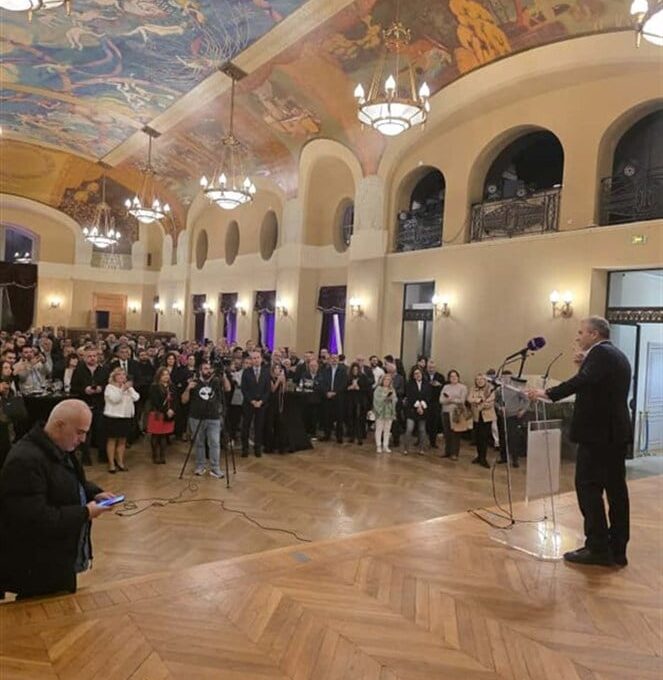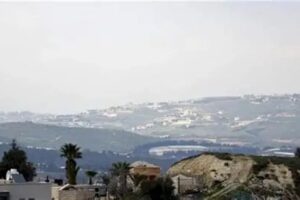“The Free Patriotic Movement fought a real battle to restore your rights, and we succeeded in enshrining them into law through Parliament in 2017,” said MP Gebran Bassil, Head of the Free Patriotic Movement (FPM), during a dinner organized by FPM Belgium in Brussels.
Bassil noted that only months before the next elections, attempts are underway to abolish the law, eliminate diaspora seats, and leave voters uncertain about their rights.
“People are asking themselves whether to register their names or not, whether to vote in Lebanon or at their consulate,” he said. “All this confusion persists even though we ensured that every legal option was made available for you to choose freely.”
He explained that the law guarantees every Lebanese citizen the right to decide where and how to vote. “Anyone wishing to cast their ballot in Lebanon can vote for the MP representing their home district, while those preferring to vote abroad can elect representatives for their country of residence,” Bassil said.
He added that, contrary to false claims, “We are not depriving you of your voting rights. On the contrary, we are the ones who granted you direct representation — whether in your district at home or in your country of residence abroad — and the right both to vote and to run for office.”
“When they accused us of depriving you of your rights, we went all the way and affirmed that every Lebanese should have the freedom to choose: to vote for their diaspora MP while living abroad or for their local MP in Lebanon,” he added.
Bassil emphasized that the interests of the diaspora outweigh any political or electoral consideration.
“When we passed the 2017 law, we knew we did not hold a majority among expatriates, yet we approved it because we believed in your rights. Those who put the country’s interest above their own are the ones truly worthy of serving Lebanon — not themselves, nor their party. When Lebanon prospers, everyone benefits; when it declines, everyone suffers,” he said.
He explained that despite coming to speak openly with the diaspora, many still face uncertainty: registration has opened, yet confusion remains, and new proposals threaten to undo the very rights they fought to secure.
Bassil reiterated that the right of Lebanese abroad to vote is a core part of their participation in Lebanon’s public life. While securing the right to vote and run for office was a major achievement, he said, the next step is to ensure parliamentary representation for the diaspora.
That idea — direct representation for Lebanese abroad — was realized for the first time in Lebanon’s history through the 2017 law and implemented in the 2018 elections, which allowed citizens to vote from abroad.
He added that for over a decade, Lebanese citizens had been deprived not of voting at home, but of exercising their rights from overseas. The next phase focused on preserving this right through participation and establishing MPs to represent each continent where Lebanese communities reside.
Bassil stressed that the diaspora was even granted the right to run for office in their respective districts. He rhetorically asked whether any other parliamentary bloc had ever presented a law specifically for the Lebanese diaspora.
He recalled that in the past, Lebanese had been united through the Lebanese Diaspora Energy (LDE) initiative, announcing that it will be relaunched at a conference on December 29–30 to revive this effort.
He highlighted the ongoing challenges faced by Lebanese abroad, particularly the exorbitant cost of airline tickets. “A ticket from Brussels to Beirut costs three times more than a flight to Cairo or Damascus, even though it’s the same plane, crew, and fuel,” Bassil said. He argued that if diaspora MPs had existed, such injustices could have been addressed more effectively.
A six-member bloc representing all parties, he suggested, could have pressured Parliament to reduce airfare, ensuring that Lebanese citizens and their families are not deprived of visiting their homeland. “This is one example,” he said, “of how diaspora MPs can make a tangible difference.”
Bassil urged awareness of the long-term risks facing the Lebanese diaspora. He recalled that many who emigrated in the late 1800s or early 1900s had lost their citizenship, prompting a law to allow them to recover it. Yet while some regained nationality, the state has not actively restored it to all eligible citizens.
He warned that without continued vigilance, future generations may face the same fate. “Imagine your children, fifty years from now, losing Lebanese citizenship because of distance from embassies or missed registrations,” he said. “With time, the problem only grows.”
Bassil further revealed that twelve million Lebanese live abroad without citizenship, while emigration from Lebanon continues — with those departing often replaced by people of other nationalities, primarily Syrians and Palestinians. “While Lebanon wishes others well, it will never prioritize them over its own citizens,” he stressed.
He emphasized that preserving Lebanese identity depends on keeping Lebanese people in Lebanon. He said that whenever officials visit foreign countries, they raise this issue with local authorities, including in recent meetings with European officials.
“Losing our national identity,” Bassil warned, “would mean losing both our people and our homeland.”
“A nation isn’t just its land; it’s its people,” he declared. “When we lose our people to emigration, we lose both our country and ourselves. This is the greatest danger Lebanon faces today. Wars and economic crises can be addressed — but identity, culture, civilization, and heritage, once lost, strip a people of their connection to their land.”
He reflected that this realization deepened during his tenure as Foreign Minister, when he worked to strengthen ties between Lebanon abroad and Lebanon at home. He questioned whether one embassy in Belgium — or any country — could adequately serve a population exceeding one million Lebanese.
He called for a broader consular network, with offices in every major city so citizens can process essential documents without long travel.
Bassil affirmed that such initiatives must follow a national strategy implemented by the Foreign Ministry or Parliament, regardless of any minister’s party affiliation.
He insisted that people’s concerns must never depend on political bias, and that consuls or economic attachés should not be dismissed for partisan reasons — comparing this to past political disputes that halted vital projects like power plants and dams, depriving citizens of electricity and water.
Turning to the current situation, Bassil lamented that Lebanon was under bombardment and fire.
“This affects not just one region or community,” he said. “When one part of Lebanon is attacked, the entire nation’s sovereignty is violated. We cannot stand by while our people are targeted, whether we agree with them politically or not. Tomorrow, if we are under attack, do we expect others to cheer or to stand with us?”
He affirmed that the FPM has never sided with any foreign power against Lebanon, always standing by Lebanese citizens — even when they are wrong — against external forces, whether Syrian or Israeli, while maintaining a clear distinction between enemy and neighbor.
Addressing the events of October 17, Bassil said the day had been intended as one of reform, but instead became “the day Lebanon was martyred, along with every Lebanese whose money vanished.”
He said the truth became evident when foreign accusations targeted a segment of the population, pushing Lebanon into economic collapse.
Six years later, he noted, the country remains unrecovered due to the absence of political will for financial and economic reform.
“The 128 MPs, all paid by the Lebanese people, have not passed a single law to stop capital flight,” he said.
Bassil contrasted the Belgian and Lebanese judiciaries, noting that Belgian authorities seized the assets of Lebanon’s former central banker Riad Salameh, while Lebanese courts not only failed to do so but released him on a $14 million bail of unknown origin.
“The greatest theft,” he warned, “is when those who looted the country are not held accountable — and that impunity is why Lebanon continues to deteriorate.”
Recalling his previous visit to Belgium in 2018, Bassil praised the Lebanese community’s strong attachment to Lebanon and loyalty to their host country.
He highlighted the diversity of the embassy gathering, saying it reflected “the Lebanon we love and must preserve”, and praised Ambassador Walid Abou Haidar for representing Lebanon with distinction.
Bassil concluded with heartfelt words for the diaspora:
“Lebanon lives through you. It has survived because of you — because you have kept it alive, economically and emotionally.”
Other Speakers
Other speakers included Nadim Jerdak, coordinator of the FPM diaspora sector, and Nabil Badr, FPM coordinator in Belgium.
They welcomed Bassil and emphasized that the gathering reflected strong coordination between FPM members in Lebanon and abroad.
Badr added that from Belgium, the message was one of unity and cooperation: despite differences in political affiliation, Lebanese abroad work together to overcome divisions and support one another, ensuring the community’s continued success.
Europe Coordinator Judy Abdel Nour also addressed the audience, noting that the memory of October 13 remains vivid and that the struggle continues.
She explained that the same forces behind the events of October 13 in Lebanon are still targeting the diaspora — though their weapons have changed from military bombardment to political attacks.
Bassil’s European Tour
Bassil is currently on a European tour, accompanied by Najy Hayek, FPM Vice President for Foreign Party Relations.
He began his visit in Belgium, meeting Thierry Mariani, President of the Intergroup on Christians in the Middle East, followed by Georges-Louis Bouchez, President of Belgium’s Mouvement Réformateur Party.
He also attended a working lunch with several European officials, where he highlighted issues related to Lebanese identity and presence abroad, with a particular focus on the Syrian refugee crisis.
Later, he met members of the Lebanese community at the residence of Ambassador Walid Abou Haidar before participating in the annual FPM Belgium dinner.



